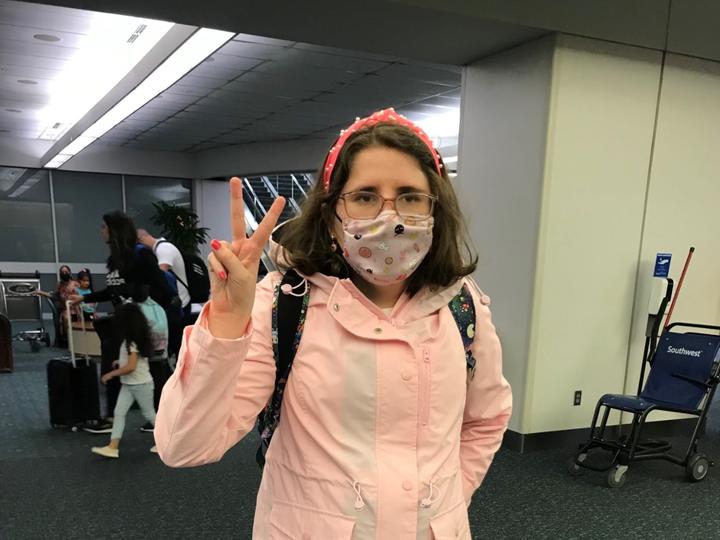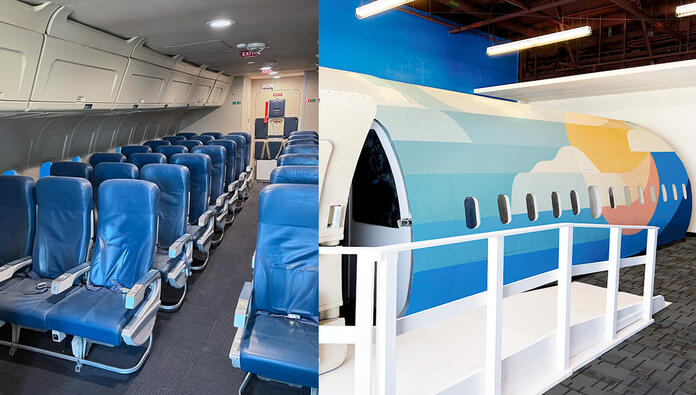Accessibility in travel: Customer shares perspective on traveling with autism
April is World Autism Month. E.V.P. and Chief Customer Experience Officer Allison Ausband sat down for an intimate conversation with a customer and childhood friend to discuss traveling with autism, share advice for parents traveling with autistic children, and show how Delta is committed to making travel accessible for everyone.
Allison Ausband oversees the end-to-end customer experience that includes the Innovation and Customer Experience teams and the 56,000 team members in Delta’s Airport Customer Service, In-Flight Service and Reservations and Customer Care divisions who deliver those experiences. In an extraordinary two years for commercial airlines, Allison and her team have continued to innovate to meet evolving customer expectations while providing peace of mind during times of rapid change.
Allison's bio | Follow Allison on LinkedIn

I grew up in McDonough, Georgia – a tight-knit town outside of Atlanta. It was a place where people came together to support one another every day. One of my best friends, Donna Renfroe, also lived there, and we’ve been lucky to raise our children together. One of Donna’s daughters, Katie, is now 30 years old. Katie is autistic. For the last 30 years, I have watched Donna and her family work tirelessly to give Katie all that she deserves and navigate a life that has brought many unexpected turns.
April is World Autism Month, and as a family of frequent travelers, I know Donna has a valuable perspective to share. She graciously agreed to answer my questions on what it’s like to travel as the parent of someone with autism, share advice for other parents and customers who may find themselves on a flight with someone on the spectrum, and provide insights on how the airline industry can better support accessible travel.
Allison Ausband: Hi Donna, thanks for doing this.
Donna Renfroe: I’m honored to do it. And it’s timely because we just took Katie to Disney World, so travel is very fresh for us. She actually walked right into the cockpit on our flight and told the crew, “Hi, I’m going to Disney World. Don’t forget to come back and get me on Wednesday.” She figured it would be the same crew from her last flight.
Allison: [Laughs] That sounds like her! I’m sure she was happy they didn’t forget. Let’s start by having you tell us a little bit about Katie.
Donna: Katie is 30 years old and is severely autistic. Autism is a spectrum and there are varying degrees. Katie is minimally verbal. We live in Birmingham, Alabama, now and travel quite frequently. My daughter loves to ride rollercoasters, and Katie actually does very well on planes because it reminds her of a roller coaster and gives her a serotonin boost. So, traveling with her sometimes can be great, and sometimes, you just never know.
Allison: Katie is so friendly with everyone. She has no problem walking right up to people and saying “hi.” But what is a hurdle you consistently run into when traveling with her?
Donna: I’m concerned I’m going to lose her! We travel a lot. Katie has a watch that I can track, but navigating a busy airport, keeping an eye on her, and managing the boarding process, especially when I’m traveling alone, can be difficult. And of course, just making sure that she’s calm during the flight can be a hurdle.
Allison: Talk a little bit more about that. We never know what our customers are going through when they step on our planes. And we know that our flight crews are trained for any type of situation. But for those who aren’t familiar with autism and happen to be on a flight where someone is sensory overwhelmed, what would you want them to know? And how can they best handle it?
Donna: Definitely, I think less is more. I would say it’s always best to remain calm and be understanding of the situation. A flight attendant who offers their snack basket or drink cart selection, anything that gives them some individual attention, can help calm them down.
Allison: Accessibility in travel has come a long way, but we know there is still work to be done. From your perspective, what improvements could Delta and the industry make to our processes that would help your family?
Donna: I was once on a flight with a woman who discreetly handed out notecards to customers that said she had an autistic child with her and to please be patient. I thought it was such a great idea. I know customers can work with Reservations and Airport Customer Service to ensure crews are notified of someone traveling with an invisible disability who may need additional assistance before boarding – I think others would benefit from knowing that too.
[I’ve often thought that] having a pin or lanyard on for employees who have some experience with autism would be a massive help. It would also serve as an identifier for customers. I can sit here and tell you all about what to do, but when you have someone who’s lived it and understands it, that makes a big difference.
Allison: That’s a great idea. We have white glove service available for passengers traveling with assistive devices and do all that we can to make a customer’s journey run with ease – whether that is helping with communication, check in, boarding, deplaning or connecting to another flight.
At Delta, we believe travel is for everyone and are committed to accessible travel. We’ve made a conscious effort to create resources for customers, like our sensory rooms in airports, but in your opinion, why is it important that the airline industry continues to become more accessible for all passengers?
Donna: It’s so important. You know, a paraplegic ought to be able to travel, an autistic person ought to be able to travel, just like everyone else. If there’s a safari in Africa they want to go on, they should be able to. It breaks my heart when I hear people say, “Oh we can’t do that trip because we can’t fly.” Because we can always try, and we can try to make it as positive an experience as possible.
Allison: That’s a great point. I can imagine many parents of autistic children might hesitate when it comes to travel – even booking a trip is daunting. You and I have had a lot of conversations about flying with Katie. What advice would you give other parents who are considering flying?
Donna: Try it. Try it one time. I would think about the things that would keep them content, just like any other child – snacks, movie tablets, and comfortable headphones. Bring the things that you know would accommodate their behaviors. Let the people surrounding you know that you’re traveling with someone who is autistic because I think that gives you a calmness. People will understand. I’ve never had anyone that has not understood.
Allison: Empathy, caring and better understanding. At the end of the day, we care deeply about every one of our customers and forging human connection. Isn’t that what travel is all about? Speaking of empathy, what do you wish more people knew or understood about autism?
Donna: Just because they’re non-verbal, that’s okay. They understand other ways of language – a smile, a pat on the shoulder, or a nod of the head. I think people have a misconception that just because they can’t talk that they’re not relatable. A lot of autistic people flap their hands. When you see someone flapping their hands in front of their face, that’s an identifier of autism. So, because they have these behaviors that are recognizable, just say, “hey, how are you” and try to talk to them like a normal person.
Allison: That’s exactly right. Thanks for sharing your perspective with us, Donna. Katie is such a joy and has taught me a lot over the years. I am thankful to know her. Please let Katie know we’re ready to see her onboard again soon! And Donna, to watch you over the years give Katie every opportunity you could – even when a little hesitant to fly at first – it never stopped you. The world is a better place with parents like you!
All said, there is always more work to be done. In 2022, Delta joined airlines across the industry to create a Passenger Accessibility Commitment
Delta has created several resources for customers to help make the travel journey an accessible one, including at:
- MSP: In partnership with the Metropolitan Airports Commission and the Airport Foundation Minneapolis-Saint Paul, Delta opened a one-of-a-kind facility that provides flyers with sensory, physical, or cognitive disabilities, those with a fear of flying and those with service dogs a place to experience a 33-foot-long mock aircraft cabin in a serene setting.
- ATL: Delta offers monthly tours where employee volunteers guide participants through experiences like TSA security screenings, exploring the terminal and boarding the plane. It gives customers the opportunity for a “practice run” in a hands-on environment.
- ATL and LGA: Delta has dedicated multi-sensory rooms for ticketed customers who need a safe space. You can call locate a Delta Red Coat for assistance onsite for access.
- Online: If you have a speech, communication-related or cognitive disability, you can indicate your preference of assistance by filling out the Accessibility Service Request form in My Trips and by notifying a Delta Representative of your service request upon arrival at the airport.
A number of other airports offer multisensory rooms for all customers, including:
- Birmingham-Shuttlesworth International Airport: B Concourse beside Chick-fil-A
- Dublin Airport: beside the 400 gates
- Hartsfield-Jackson Atlanta International Airport: F Concourse
- Myrtle Beach International Airport: Baggage Claim
- New York LaGuardia International Airport: Terminal C
- Pittsburgh International Airport: A Concourse
- Portland International Airport: Concourse D across from D11
- San Diego International Airport: Between entrance and exit of TSA
- Seattle-Tacoma International Airport: ST Level A gates by the train
Travelers requiring special accommodations or those who have concerns about the security screening process at the airport may ask a TSA officer or supervisor for a passenger support specialist who can provide on-the-spot assistance.
At Delta, we’re serious about connecting the world. That means having empathy and understanding for the people who travel with us. Are we always going to get it right? No. But, we’re going to listen to everyone we serve, we’re going to learn, and we’re going to get better every time.
© 2025 Delta Air Lines, Inc.


